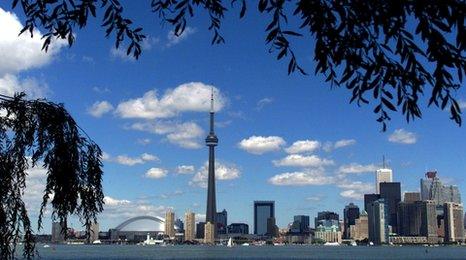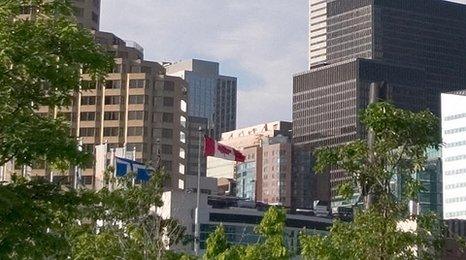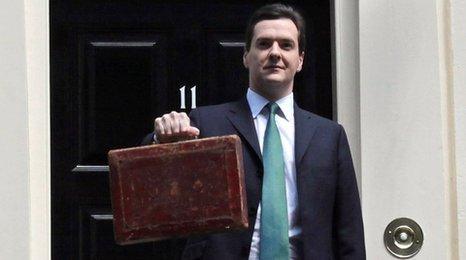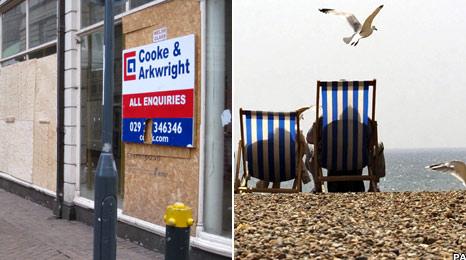How Canada slashed its public spending
- Published

Toronto is Canada's largest city with more than five million inhabitants
When you drive through downtown Toronto, you can't help but notice the slim, towering structure of the CN Tower.
It's one of the seven modern wonders of the world - at 553 metres (1,814ft) tall, one of the highest free-standing buildings on the planet.
In the shadow of it, on the shores of Lake Ontario, sits the Rogers sports centre.
What the structures have in common is that they both saw some stormy times in Canada in the 1990s.
What to cut?
In 1993, Canada faced a deficit of C$39bn (£25bn) which represented 9% of its GDP ( the total value of all the goods and services produced in the country).
The Prime Minister at the time, Jean Chretien, tackled the problem by slashing public spending.
in pictures: Young Canadians on cost-cutting , external
He believed severe cost cutting in the public sector was the only way to sort Canada's finances.
In three years, he converted the deficit into a small surplus.

Toronto skyscrapers
What's the effect?
More than 40,000 jobs in the public sector were axed in one go. From the outset, the government made it clear, nothing was being ruled out. Anything could be cut.
Extensive cuts in health care and education were central to the plan, meaning hospitals were closed and nurses and teachers lost their jobs.
Waiting lists shot up in the hospitals that stayed open.
In schools the average class size went up from 25 to 35 children as there were fewer teachers.
Canada v Britain - is it a fair comparison?
While all public services faced cuts in Canada, David Cameron's already pledged to ring-fence Britain's education, health and international aid budgets.
The UK has a much bigger deficit so there's a much bigger problem to deal with.
The global economy is in a worse state than when Canada had to sort its finances.
Things like banks, insurance and other financial services are much more important in Britain. So when world stock markets are in trouble, the UK is affected more.
What's the reaction now to what happened then?
Ryan Roberts is 19 years old, and lives in Toronto.
He said: "I don't think that's the best way to do it.

Lucy Barker thinks former PM Jean Chritien won't be remembered kindly
"I believe in government spending, I believe in putting in more money to stimulate the economy, especially education because these are the people who will be making the money in the end."
Lucy Barker is a student. She's 22 years old.
She told Newsbeat: "I think right now the public sector's restrained, so I think that any more cuts would be bad.
"There would be disastrous consequences. I don't think it's helped Jean Chritien's legacy. He's not seen as one of our best."
Ian is a drummer in a band. He's 30 years old.
He said: "The one thing he did people didn't like was he cut the armed forces.
"People wanted it though because they didn't want the deficit.
"Year one of the budget everyone thought would be worse and it wasn't, and they thought he should have done more, and then he did more because that was the public reaction."
- Published22 June 2010

- Published6 May 2010
- Published26 January 2010

- Published9 December 2009

- Published2 December 2009

- Published6 August 2009